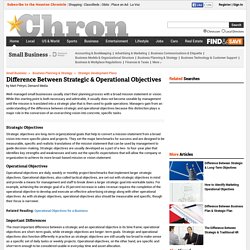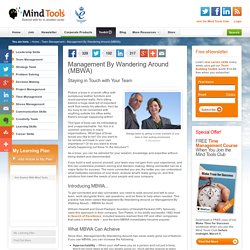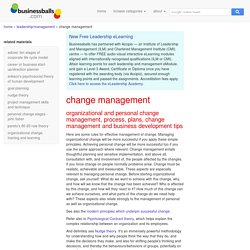

Greater jobs. Social Work News & Social Care Jobs. CoramBAAF. 20130522statutory_guidanceassessment_and_approval_of_foster_carers_final.pdf. Difference Between Strategic & Operational Objectives. Well-managed small businesses usually start their planning process with a broad mission statement or vision.

While this starting point is both necessary and admirable, it usually does not become useable by management until the mission is translated into a strategic plan that is then used to guide operations. Managers gain from an understanding of the difference between strategic and operational objectives because this distinction plays a major role in the conversion of an overarching vision into concrete, specific tasks. Strategic Objectives Strategic objectives are long-term organizational goals that help to convert a mission statement from a broad vision into more specific plans and projects. They set the major benchmarks for success and are designed to be measurable, specific and realistic translations of the mission statement that can be used by management to guide decision-making. Operational Objectives Related Reading: Operational Objectives for a Business Important Differences.
Management By Wandering About (MBWA) - from MindTools.com. Staying in Touch with Your Team Manage better by getting to know members of your team in their working environment. © iStockphoto Picture a boss in a lavish office with sumptuous leather furniture and wood-paneled walls.

He's sitting behind a huge desk full of important work that needs his attention. He's far too busy to be concerned with anything outside his office walls: there's enough happening within! This type of boss can be intimidating and unapproachable. As a boss, you can be admired for your wisdom, knowledge and expertise without being distant and disconnected. If you build a wall around yourself, your team may not gain from your experience, and this can undermine problem solving and decision making.
Introducing MBWA... Management Tips: 10 Quick Tips for How to Delegate. Delegation is a key tool in the effective management of people, time and resources.

Here are my 10 quick tips for how to delegate (with links to more resources should you need them!) How to delegate tip #1. Get Clear on Why Delegation is Important – to You As you’re reading this article I’m guessing you want to delegate (or delegate more). Why is that? Do you want to; 1. 2. 3. Getting clear on your goals for delegation (and any of the goals above are very good goals) you’ll be much more likely to get started on the delegation process How to delegate tip #2. You now have a goal for delegation. How to delegate tip #3. The first step in the delegation process is to identify the tasks that would be suitable for delegation.
How to delegate tip #4. Which employee is most suited to the task? • an interest in the task or • a development need the task will help them meet or. How to Manage Time With 10 Tips That Work. Chances are good that, at some time in your life, you've taken a time management class, read about it in books, and tried to use an electronic or paper-based day planner to organize, prioritize and schedule your day.

"Why, with this knowledge and these gadgets," you may ask, "do I still feel like I can't get everything done I need to? " The answer is simple. Everything you ever learned about managing time is a complete waste of time because it doesn't work. Before you can even begin to manage time, you must learn what time is. A dictionary defines time as "the point or period at which things occur. " There are two types of time: clock time and real time. In real time, all time is relative. Related: Spring-Cleaning Tips for Your Business Which time describes the world in which you really live, real time or clock time? The reason time management gadgets and systems don't work is that these systems are designed to manage clock time.
The good news is that real time is mental. Care Planning Regs. From the Observer. 8 Tips for De-Escalating Conflict. Change management principles, process, tips and change theory and models. Instead, change needs to be understood and managed in a way that people can cope effectively with it.

Change can be unsettling, so the manager logically needs to be a settling influence. Check that people affected by the change agree with, or at least understand, the need for change, and have a chance to decide how the change will be managed, and to be involved in the planning and implementation of the change. Use face-to-face communications to handle sensitive aspects of organisational change management (see Mehrabian's research on conveying meaning and understanding).
Encourage your managers to communicate face-to-face with their people too if they are helping you manage an organizational change. Email and written notices are extremely weak at conveying and developing understanding. If you think that you need to make a change quickly, probe the reasons - is the urgency real? Be mindful that the chief insecurity of most staff is change itself. Responsibility for managing change see also.